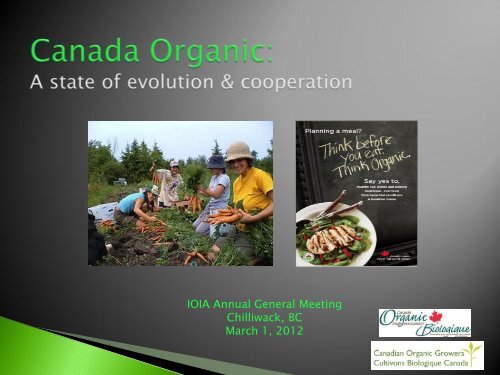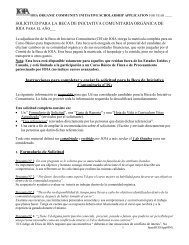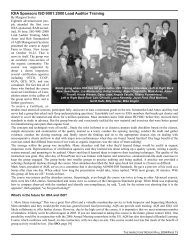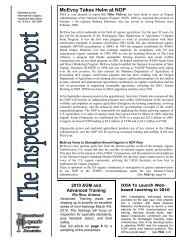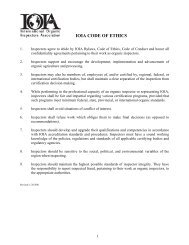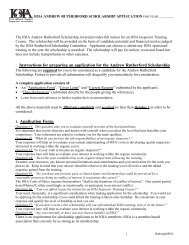IOIA Annual General Meeting Chilliwack, BC March 1, 2012
IOIA Annual General Meeting Chilliwack, BC March 1, 2012
IOIA Annual General Meeting Chilliwack, BC March 1, 2012
Create successful ePaper yourself
Turn your PDF publications into a flip-book with our unique Google optimized e-Paper software.
<strong>IOIA</strong> <strong>Annual</strong> <strong>General</strong> <strong>Meeting</strong><strong>Chilliwack</strong>, <strong>BC</strong><strong>March</strong> 1, <strong>2012</strong>
$59 million US37 million ha of ag land is organic0.9% of all ag land is organic1.6 million producers; more than ¾ indeveloping countriesStrong markets still growing; newmarkets emerging in BRIC70 countries have organicregulations/standards of some typeSource: IFOAM/FIBL
source: FiBL / IFOAM 2010
‣Most important markets are regulated, with unique mandatorystandards and requirements (US, EU, Japan)‣Other markets have recently introduced draft / new regulations:(South Korea, Taiwan, Australia, Brazil, China, Israel, etc)‣As markets become more regulated, countries are looking towardsequivalencies, harmonization.‣Canada has a strategic edge with access to 95% of world marketthrough equivalencies with US & EU, but some restrictions apply.‣Canada’s market is heavily supplied by imports (75%)‣Need to differentiate & brand Canadian products from competitors‣Focus on growing our domestic market and sector throughconsumer education, training, mentorship, value chain, valueadded
• Approximately 3,700 farms, 695,463 hectares plus210,000 ha for wild harvest and pasture.• Certified organic farms account for 1.7% of thetotal number of farms in Canada.• More than 1,100 certified organic processors andhandlers of ingredients and consumer-readyproducts.Source: Canadian Organic Growers
12001000800Farms/primary producers 2009600Farms/primary producers 2010Processors (includes foodmanufacturers & seed cleaners)400Handlers (includes packers, brokers& retail)2000<strong>BC</strong> AB SK MB ON QC NB NS PEI NFL YK NTSOURCE: Canadian Organic Growers
Certified Organic Farms in Canada 1992-200945004000350030002500200015001000500092 93 94 95 95 97 98 99 00 01 02 03 04 05 06 07 08 09SOURCE: Canadian Organic Growers
• Retail sales of organic food: estimated $2 billion in 2008(doubling sales in two years)• COTA estimated the market $2.6 billion in 2010• 2.5% of total food retail sales• Private label accounts for 21%• Demand is increasing but supply is tightSource: AAFC Retail Study 2008; COTA
Packaged & Prepared (15%)Meat, Fish, Poultry (1%)Beverages (18%)Dairy & Eggs (13%)Bread & Grains (12%)Fruit & Vegetables (41%)Source: AAFC Retail Study 2008
•Soya drinks•Milk•Yoghurt$47.3M$37.2M$35.4M•Cereals $32M•Coffee•Soup•Eggs•Breads•Baby Food•Juices & Drinks$27.2M$19.5M$15.7M$13.1M$11.4M$9.8MSource: Statistics Canada Import Data Source: AAFC Retail Study, 2008
Conventional Retail: $925.8 million (45%) Direct to Consumer: $400 million (20%) Other Retail: $712 million (35%)(specialty markets, natural health food stores,foodservice)Source: AAFC Retail Study
•Almost 50% of Canadiansbelieve it is more importanta food be labelled naturalthan organic (C<strong>BC</strong> Jan.2010)•60% of Canadianconsumers believe it'simportant a new product bemade from "all-naturalingredients," while 45 %have "greater trust" innatural products than thoselabelled organic(BrandSpark International)
• Under the OPR, we cannot use “Certified Organic” on our labels• But: because most provinces do not yet regulate organic within theprovince, there is organic (certified) and organic (not certified)product confusing and competing for the same consumer• How do we address thedouble standard?• Do we maintain two-tierorganic within the provinceor do we try to streamlinethe rules across thecountry?
• All signs point to decliningproducer numbers in 2011• Just as the market isheating up and globalcommodity prices are nearrecord-high• How can we find long-term standards funding?• How can we avoid the old cyclical agriculture up-and-down?• How can we ensure producers stick with certification for the longterm?• How can we support new entrants, provide knowledge transfer,and encourage conversion?
• GE Alfalfa has been approved in the US, and is awaiting varietalregistration here: the first perennial GE and critical organic rotation• NY Judge ruled to dismiss case against Monsanto last week…• The Cdn government has just concluded “Low Level Presence”threshold consultations with industry.• What does “coexistence” look like? Is it a bad word?
Recently conducted SWOTS:• Organic Value Chain Roundtable strategicplanning• Branding and Marketing CampaignResearch• COTA’s Long-Term International Strategy• Provincial strategic plans
Strengths◦ New standards, certification, accreditation systems◦ Increased organic sector capacity◦ Canada Brand and buyer image of Canada◦ Diversity: consensus standards, cooperation, cross-pollination◦ Dedicated industry organizations◦ ResearchWeaknesses◦ Challenges facing new and existing producers, processors, distributors◦ Limited data and analysis of full value chain◦ Risk management along the supply chain, public relations◦ Diversity: horizontal sector across all commodities and scales◦ Lack of funding and mandatory provincial regs◦ Confusion
Opportunities◦ Significant growth in consumer demand, import displacement◦ Strategic equivalencies and trade recognition, exports◦ Growing consumer awareness of food issues◦ Potential to increase domestic supply◦ Potential to connect with other agriculture organizations◦ ResearchThreats◦ Low market power and downward price pressure across industry◦ GE impacts on organic integrity and market◦ Difficulties in “connecting the dots” — with each other, other agricultureorganizations, with consumers◦ Attrition◦ Negative publicity
• OACC/OFC wrapping up science cluster andplanning for 2013• Great collaborations with researchers acrossCanada + industry• Opportunities for further communicationswith producers
Launched Dec. 2006 by AAFC Largest of ten national roundtable groups(about 22 members from across Canada) Working groups: increasing Canadian organiccapacity; market development; regulations;and research and innovation <strong>Meeting</strong>s 2X per year Face-to-face with senior government officials
GE study Organic seed study Climate change and organic farming Food safety impact review Canadian Organic Retail Practices guide Organic brand development strategy(consultation on promotional concepts is underway)
Tagline/SloganBrand EssenceBrand VisionBrand MissionPositioning StatementValue PropositionBrand PillarsIt’s in our good nature(under review)Our better natureHigh quality Canadian organic products in every homeTo grow and promote a vibrant Canadian OrganicSectorThe Canadian Organic Sector provides organic productsof the highest standards – it’s in our nature to care forthe health and vitality of all communitiesCanada Organic, the closest thing to nature. It startswith a healthy attitude, pure air, water, and land.Caring Credible CommittedBrand EquitiesIntegrity Sustainable Healthy CanadianPassionateSource: OVCRT 2011
Recommendation: evolve the initial tagline“It’s in our good nature” to a simpler andaction oriented option:Option A: Canada Organic, For the BetterOption B: Canada Organic, Eat RealSource: OVCRT 2011
• Organic Week (COG & COTA) + regional/localgroups across Canada• COEN connecting extension efforts/info• COG & <strong>IOIA</strong> working together for Canadiantrainings• COTA & CHFA signed formal agreement forcollaboration• OACC/OFC science cluster + researchers/industry• OACC/COG special organic science magazine• OMRI outreach to Canadian sector• National groups (COG, COTA, OFC, OACC, OVCRT)working together for risk mgt/mitigation
Increasing collaborationDoing more with less(gov’t, NGOs, funding)Engaged dialogue withconsumersIncreasing science oforganicsEmbracing new farmers& ideasCelebration of “organicmovement” andmaintaining motivationfor the big picture
OrganicPassionateGlobalHealthyCommunityPeopleSustainableFreshResponsibleProfessional44
Thank youGunta VitinsResilient Solutions Consultinggunta.vitins@gmail.comTel: 778-772-5996Beth McMahonCanadian Organic Growersbeth@cog.cawww.cog.ca45


